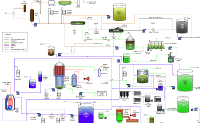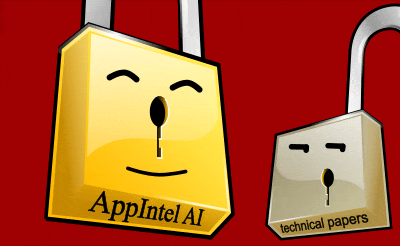Artificial intelligence using vetted oil and gas information
Using anything else is dangerous
 Industry advances are no longer being vetted in peer reviews
and conferences. Government regulators now vet the newest technology. You
can find it all in AppIntel AI.
Industry advances are no longer being vetted in peer reviews
and conferences. Government regulators now vet the newest technology. You
can find it all in AppIntel AI.
These days, new technology is changing the way we operate oil and gas including parallel operations like rubellite and lithium mining. Its all about better and smarter ways to extract and process the great resources of the earth.
The government is a picky adjudicator — they have the power to reject submissions and use it often even for technicalities.
The regulator struggled with one operator finally rejecting his submission for deep well disposal capacity. This rejection came after several back and forth question/answer volleys between the operator and the regulator. The final reason for rejection: the government decided the operation was conducted in the wrong order — they wont approve until more testing is completed.
This is a common rejection technicality, see the discussion in the submission documents on our web portal.
Get details of this cool tech Subscribers get them for freeThe operator and the consultant who completed his application could have recognized this technicality if they had reviewed similar recent submissions in AppIntel AI.
Operators rely on technical information, and it must be current. Using outdated oil and gas information not only puts you at odds with the regulator but also leaves you behind the industry, potentially threatening your operations and the lives of employees.
Trusted, trusted sources
But its not just about being up to date — you also need to trust your sources. Relying on dodgy or outdated info can be downright dangerous and put people at risk. For example, using unverified data from open web platforms like ChatGPT, Gemini, or CoPilot isnt a safe bet for oil and gas intelligence. These are the kinds of sources you want to avoid.
On the flip side, super-reliable sources like textbooks and technical papers can be out of date, which doesnt help much in a fast-moving industry.
The sweet spot? Info thats both trustworthy and current (quadrant 1 in the trust-currency matrix). Service company websites can be helpful, but keep in mind that they might only promote their own products and the data can be hit or miss when it comes to recency.
Raw data created for the industry is usually right up to the minute, but you might have to dig for it. Analyzing that data can take a lot of time.
AppIntel AI uses reliable, government-submitted oil and gas data that is organized, well-documented, and current. Its accuracy and accessibility make it a top choice for oil and gas professionals.

Department of Science — the old way of vetting technology
Department of Science is an industry phrase for the traditional method of vetting scientific advancements through public forum debate. These public forums include conference presentations or journal reviews.
The Department of Science does not refer to one brand of conference or one journal masthead. It collectively refers to all these however presented.
Examples in industry common speech:
Even though this method looks promising, we cant trust it until it has endured the Department of Science.
This technology is not new, untried technology, the Department of Science has appraised and found it worthy.
The speed of technical advancement is accelerating. Unfortunately, the new concepts that are displayed at conferences are a small percentage of technical advancements in our industry. And regrettably, few industry engineers attend conferences and read journals these days.
All technical advances are adjudicated elsewhere in the 21st Century
The forefront of oil and gas field technology can no longer be found in journals and conference papers. Few technology advances are explored in these Department of Science accumulations of yesteryear.
Instead, the newest practical field technology crops up in submissions to regulators. If a technology has progressed to field scale, it is found in an industry submission.
Each industry submission is a case study.

Technology vetted by a picky regulator
The picky regulator requires all the detail. They adjudicate the submission with a careful eye to understand the technical merits of the entire operation. They challenge every issue, every pressure. They have the power to refuse approval and use it often.
On the other hand, technical papers are vetted by industry volunteers that have no stake in getting to the truth other than their altruistic industry interest. They dont challenge with back-and-forth dialog. They dont have any power to cancel the technical paper effort.
Maximize your ability to trust the AI answers. Look for an AI that is trained on vetted, trusted, in-depth data with field tested solutions.
The regulator does a deep dive before they will approve
Industry advances are no longer being vetted by the Department of Science in peer reviews and conferences. Regulators now vet the newest technology implemented in field trials and documented in industry submissions.
Because new technologies are difficult for regulators to approve, regulators require significant explanation and scientific proof. All this vetting back and forth is included in the submission documents.
AppIntel AI is trained on submission documents and the regulator response.
?subject=I want a cheap and cheery trial of AppIntel&body=Sign me up for an AppIntel trial. %0D%0A%0D%0AMy Name:___%0D%0AMy Phone Number:____%0D%0A%0D%0AType of applications:___%0D%0A%0D%0APricing: www.appintel.info/short-term-search/%0D%0A%0D%0A(Or call AppIntel Sales at 403-803-2500.)">Contact us now for a trial of AppIntel AI.
Tags: AppIntel advantage, AI in oil and gas
 Granger Low 7 Nov 2025
Granger Low 7 Nov 2025

Measuring the rate of oil and gas technology growth
Energy transition inside the oil industry

The rise of water recycle
Join or perish

AppIntel AI hit alerts
Ignite your insight

Blowdown and NCG injection
SIRs often reveal more than submissions

AppIntel AI contains much more than technical papers
More current. More coverage. More detail. More trusted.

New flood to double reserves for heavy oil pool
The age of water floods is not over

Flood repatterning
Extended life support

AI makes opportunity more accessible than conferences
Which sources of technical information do you trust?

Repairing microannulus in thermal wells
Check out the 4D seismic chamber thickness map

In-house AI attempts fail-80%
Spin off your in-house AI attempt

Facility fugitive emissions scrutiny
Keep your eye on the horizon of oil and gas change

AI predicts the future for 2026
using leading indicators

Celebrating 2025, a year of innovation
Oil and gas paradigm shifts this year

RTF: Most refused submission type in November
Leading indicators from industry

Astrobleme impacts deep well disposal scheme
Learn from the experience of other operators

Non-meridian thermal wells
Still drilling horizontal wells N‑S? Why?

Steam surfactant co-injection
Want to win? What is your competitive advantage?





 Calgary, Alberta, Canada
Calgary, Alberta, Canada
 Share
Share